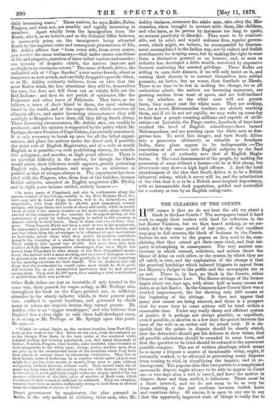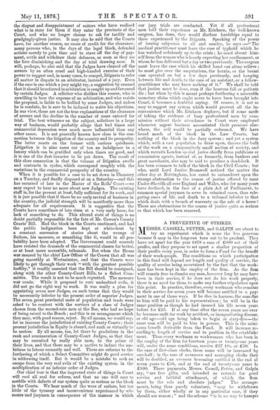THE CLEARING OF THE COURTS.
OW comes it that we do not hear the old cry about a block in the Law Courts l The newspapers found it hard work to supply their readers with food for reflection in the last Easter Vacation, but we then heard nothing, as we cer- tainly did in the same period of last year, of that excellent stop-gap in dull seasons, the block of business in the Courts. Suitors do not write to the papers as they used to do, com- plaining that they cannot get their cases tried, and that, ini- quity is triumphing in consequence. The very ancient con- troversy in which counsel, solicitors, and suitors threw the blame of delay on each other, or the system by which they are all ruled, is over, and the explanation of the change is that the practical hardships which induced litigants to appeal from her Majesty's Judges to the public and the newspapers are at an end. There is, in fact, no block in the Courts, either Chancery or Common Law. The Easter sittings of the former began about ten days ago, with about half as many causes set down as at last Easter. In the Common-Law Courts there was a decided improvement, the list showing only 520 causes at the beginning of the sittings. It does not appear that many new causes are being entered, and there is a prospect that for some time to come actions will be tried within a reasonable time. Under any really cheap and efficient system of justice, it is perhaps not always possible, or expedient, even if possible, to shorten to a few days the period between the issue of the writ in an action and its actual trial. It is de- sirable that the points in dispute should be clearly stated, that the defendant should put his defence in clear terms, that all possible admissions should be recorded in some form, and that the question to be tried should be reduced to the narrowest possible compass. The use of written pleadings, which seems to so many a litigant a source of inexcusable delay, ought, if rationally worked, to be effectual in preventing many disputes from coming to trial, in simplifying the inquiry, and in re- ducing costs. The popular idea that two parties to a complicated mercantile dispute ought always to be able to appear in Court one or two days after a writ is issued, and have the matter in dispute there and then settled, is fallacious. There must be a short interval, and we do not seem to be so very far from arriving at the just medium between foolish haste and vexatious delay. Of course, it is open to any one to say that the apparently improved state of things is really due to the disgust and disappointment of suitors who have realised what is in store for ' them if they enter the precincts of the CoUrt, and who no longer choose to ask for tardily and grudgingly-given justice. It may. also be said that the Courts have, for another reason, no cause of credit for the clearance; many persons who, in the days of the' legal block, defended a.ctioits merely to gain time and' to stave off the day of pay- ment, settle and withdraw their defences, as soon as they see the lists diminishing and the day of trial drawing near. It will, perhaps, be also said that the Judges have cleared off the arrears • by an often cruel and high-handed exercise of their powerto suggest and, in many cases, to compel, litigants to refer all matter in dispute to an arbitrator, instead of a jury. Even if the case is one which a jury might try, a suggestion by counsel that it should be referred to arbitration is caught up and favoured by certain Judges. A solicitor who dislikes this course, who is unwilling to bear the expense Of an arbitration, and who resists the proposal, is liable to be bullied by some Judges, and unless he is resolute, he is sure to be induced to waitte his objections. In our view, these are not the true explanations of the clearance of arrears and the decline in the number of cases entered for trial. The best witnesses on the subject, solicitors in a large way of business, would probably allege that bad times and commercial depression were much more influential than any other cause. It is not generally known how close is the con- nection between the litigation of the country and its prosperity. The latter reacts on the former with curious quickness. Litigation is in nine cases out 'of ten an indulgence in a luxury which can be gratified only when times are good, and it is one of the first luxuries to be put down. The result of this close connection is that the volume of litigation swells and contracts in cycles, which correspond roughly with the variations in the commercial prosperity of the country. When it is possible for a case to be set down in Chancery on a Tuesday,-and finally disposed of on a Saturday—and this has occurred of late in the Master of the Rolls' Court—we may expect to hear 'no more about new Judges. The existing staff ii, for the present at least, fully sufficient for its work, and it 'is jnst possible that if there be no early revival of business in the country, the judicial strength will be manifestly more than adequate for all requirements. It is suggestive that the Courts have sometimes of late risen" at a very early hour, for lack of something- to do. This' altered state of things is no dont:A partially responsible for the fate of Mr. Cowen's County Courts' Bill. Had the block' in the Courts continued, and had the public indignation been kept at white-heat by a constant succession of stories about the wrongs of Suitors, his measure, or something like it, would in all pro- bability have been adopted.' The Government could scarcely have resisted the demands of the commercial classes for better, or at 'least mere accessible, tribunals. But when the House watfassured by the chief Law OffiCer of the Crown"that all was going smoothly at Westminster, and that' the Courts were likely-to get- throtighlheir-work with the greatest possible fatility," it readily assented that the Bill should be consigned, along -with the other County-Court Bills, to a Select Com- mittee. The result is not to be much regretted. The measure was crude. While' it proposed to cure undoubted evils, it did not go the right way to work. It was really a plan for appointing seven nevr Judges, onsuch terms that they would be necessarily inferior to the present order of superior Judges. The seven great provincial seate Of population' end trade were asked to be content With the services of a class of Judges choSen from the second-rate Men at the Bar, who had no hope of being raised to the Bench ; and this is an' arrangement which they may, with good reason, reject. By all means, we would say, let- us increase the jurisdiction of existing County Courts ; their present jurisdiction in Equity is absurd, and such as virtually to be useless: Bran means, too, let there be gradations in the rank and remuneration of County-Court Judges, so that they may be recruited by really able men,' in the prime of their lives; and that there may be a motive to induce the am- bitious to labour' earnestly and' well. These are reforms to the furthering of which a Select Committee might do good service in addressing itself. But it would be a mistake to seek an escape from the very real evils of the existing system in the multiplication of an inferior Order of Judges.
Our chief fear is that the improved state of things in Court will cool all zeal for reform;' and that no one will care to meddle with defeets of our system quite as -serious as the block in the Courts; We'hear mrtch Of the woes' of suitors, but too little 'of the tyranny ' and inconvenience 'experienced by wit- nedietrUnd jurymen in consequence of "the manner in which ' our jury trials are conducted. Yet if all professional men told their experience as Mr. Erichsen, the well-knot-a surgeon, has done, they would disclose hardships equal to those experienced by the litigants. Speaking of the posVer of issuing subpcenas to all and sundry, he says :—" The medical practitioner must leave the case of typhoid which he has watched sedulously up to the crisis ; he must absent him- self from the woman who is hourly expecting' her confinement, or whom he has delivered but a day or two previously. The surgeon must leave the case which his skilled hand can alone relieve ; he must give over the amputations, the hernia, or the breast ease operated on but a few days previously, and hanging between life and death, to the care of an assistant, or a fellow- practitioner who may know nothing of it." We shall be told that justice must be done, even if the heavens fall or patients die ; but when by this is meant perhaps furthering a miserable monetary claim which ought never to have been brought intb Court, it becomes a doubtful saying. Of course, it is not' So easy to suggest any system which would prevent all the in- convenience which Mr. Erichsen deplores, but if some mode of taking the evidence of busy professional men by com- mission without their attendance in Court were employed whenever urgent business necessitated their presence else- where, the evil would be partially redressed. We have heard much of the block in the Law Courts, but nothing of the block in the Jury system'; and yet a systerh which, with a vast population to draw upon, throws the bulk of the work on a comparatively small section of society, and which recruits London special juries chiefly from publicans or commission agents, instead of, as formerly, from bankers and great merchants, also may be said to produce a dead-lock. It has been common to talk of the block in the Civil Courts ; but who, until Lord Justice Bramwell noticed the matter the other day at Nottingham, has cared to animadvert upon the strange obstruction to the course of justice offered by moat Under-Sheriffs all over England and Wales, who for many years have declined, in the face of a plain Act of Parliament, to summon special jurymen to serve in criminal cases, thus rele- gating cases of life and death to a tribunal inferior to that which deals with a breach of warranty on the sale of a horse ? These are obstructions to the course of justice quite as serious as that which has been removed.







































 Previous page
Previous page